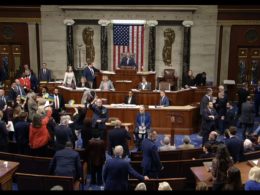In response to Russia's invasion of Ukraine, Western nations have frozen an estimated $300 billion in Russian assets. While this move was significant, these funds have yet to be utilized to support Ukraine's defense efforts. The potential of these assets goes beyond reconstruction—they could provide Ukraine with direct means to purchase essential military equipment, bolstering its resistance against aggression.
Most of these frozen assets are held in Europe, particularly in Euroclear, with substantial amounts in the United States. However, Western countries are reluctant to disclose the exact figures.
A key development came on 24 April 2024, with the US Congress passing the REPO Act. This legislation authorizes the President to seize frozen assets and establish a Ukraine Support Fund. By 20 October 2024, it mandates a comprehensive report on Russian assets within US jurisdiction, including those in US financial institutions, correspondent banking accounts, and sanctioned offshore partnerships. This requirement lays the groundwork for informed, decisive action.
Not $5 billion, but $19 billion
The Biden administration has previously said that approximately $5 billion of Russian reserves are held in US financial institutions and that most are held in Europe, in Euroclear. However, this is only part of the complete story.
In the case of the US and likely other non-EU countries, a financial institution, such as Euroclear, must work through a US correspondent bank account to transfer offshore dollars. The REPO Act enables the US to exert its complete authority over overseas Russian assets that interact with the US jurisdiction. To explain that a bit further, all US dollar transactions by Euroclear involve US correspondent banks, are subject to the sanctions regime, and are a basis for jurisdiction by the US government.
According to Euroclear's most recent public financial statements, it holds about €173 billion related to sanctioned Russian assets that have largely matured into cash.
7% of that €173 billion is invested in the US dollar, which is equivalent to about $14 billion on top of the previously mentioned $5 billion.
Some 8% is in Canadian dollars, and some 17% is in British pounds. Thus, these non-EU countries can seize a slice of Russian assets through Euroclear and other depositories and accounts.
In the dark
One of the fundamental problems, though, is that we don't have a clear picture of the total amounts and nature of these seizable assets. No country accepts Switzerland has issued a formal government declaration of its Russian reserves, and even Switzerland doesn't specify the form the assets take.
The first step is bringing these numbers to light.
The US administration should report these numbers by 20 October, but they may miss this deadline because they have previously missed other deadlines. So, this is a point where we need to press them to fulfill their minimum mandatory disclosure duties.
What can be done?
Thirty days after that mandatory public reporting, the REPO Act gives the president the authority to seize and transfer the assets to the US-based Ukraine Support Fund. After they're transferred, USAID and the Secretary of State can determine how those funds will be used. This is important because it would effectively remove the frozen assets from the president's sole control, which would shield against unilateral executive action to, say, unfreeze the funds and return them to Russia.
So, before a new administration potentially shifts US policy, taking this step now would provide important insurance. It would also show the US commitment to seizing and repurposing Russia's state assets. Even if that's not now, it would be an important signal of future intent to use them.
The battle over total Russian asset seizure
Trending Now
That brings us to why the administration isn't doing this. The official explanation is that "the US wants to move with the rest of the G7.” There is significant resistance within Europe for essentially the same reasons we've heard for the last two years or so about escalation, retaliation, the financial system, etc.
The other reason is that a lot of the focus has shifted to this $50 billion loan, which is still in progress of being worked out and negotiated. The $50 billion loan is good and important, and if it's successful, it will deliver much-needed funding to Ukraine. So, of course, we want it to materialize, but this loan cannot be a substitute for full confiscation.
And importantly, the loan is not mutually exclusive from actually seizing the assets themselves.
The loan will not be impacted if the administration uses its authority to transfer the assets into Ukraine's support fund. It is not either or, and it can also be done simultaneously.
So, the US has taken a significant leadership role in the G7 with the passage of the REPO Act, which allows asset seizure.
However, the Biden administration must report on all the assets and transfer them to the Ukraine support fund. The REPO Act provides the Biden administration with the tools to prevent Russia from evading justice by hiding its assets in Europe. And so we have to keep pushing. The political message has to remain the same, which is simple.
$50 billion is a step in the right direction, but not the overhaul. And that's needed. Only full confiscation satisfies that.
And the US now has all the tools it needs to accomplish that. It must simply use them.
Editor's note. The opinions expressed in our Opinion section belong to their authors. Euromaidan Press' editorial team may or may not share them.
Submit an opinion to Euromaidan Press
Read more:
- Seizing Russian assets for Ukraine: everything you need to know
- Ukraine still awaits $ 50 billion from frozen Russian assets amid legal and political uncertainty
- No Russian assets profits for Ukraine aid, says Switzerland
- Six American anti-Ukraine aid myths that just won't go away
- US aid to Ukraine: big wins on a small budget





